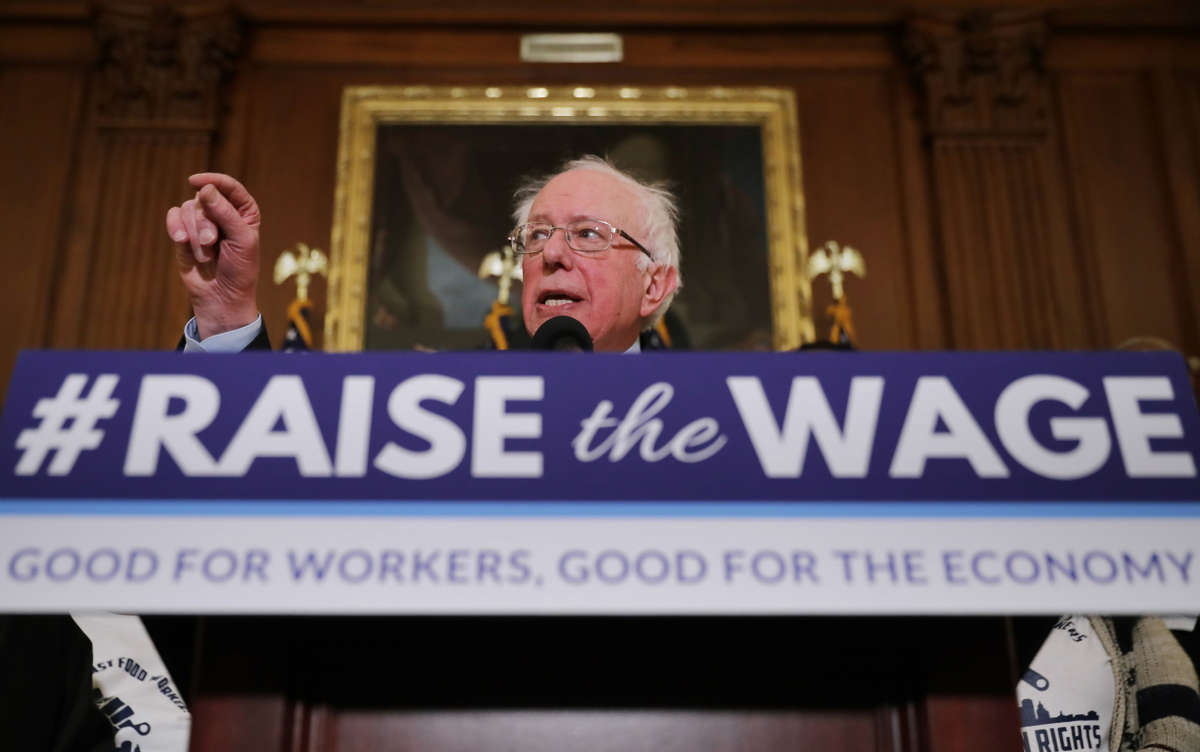The Fight for $15 movement has come a long way since it started in 2012, as House and Senate Democrats have introduced a bill to raise the federal minimum wage to $15. With the explicit approval of President Joe Biden, the progressive goal is, some say, now closer than ever.
The bill, which the Democrats call the “Raise the Wage Act of 2021,” raises the minimum wage incrementally over the next four years until it reaches $15 an hour in 2025. The federal minimum wage is currently $7.25 an hour. It also raises the federal minimum wage for tipped workers from $2.13 to $4.25.
Though the wage raise faces opposition from Republicans, Democrats are looking into ways to use their narrow majority to pass the bill.
On Tuesday, the number two Democrat in the Senate, Dick Durbin (D-Illinois), said that he is looking into passing the $15 minimum wage through budget reconciliation, something that Senate Budget Chairman Bernie Sanders has also been discussing this week. And on Monday, Roll Call reported that the House Budget Chairman John Yarmuth is saying that Democrats in the House are also going to try passing the measure through reconciliation.
Don’t miss a beat
Get the latest news and thought-provoking analysis from Truthout.
Biden threw his weight behind the minimum wage raise earlier this month while introducing a coronavirus economic stimulus package that included other labor provisions like increasing paid family leave and expanding unemployment benefits.
Last year, House Democrats passed a version of the Raise the Wage Act, but Mitch McConnell (R-Kentucky) refused to bring it to a vote in the Senate.
The current federal minimum wage of $7.25 has been criticized widely by progressives and Democrats. Sanders has repeatedly said that it is insufficient: “Let’s be clear. The $7.25 an hour federal minimum wage is a starvation wage,” he said in a statement. “No person in America can make it on $8, $10, or $12 an hour.” Sanders has advocated for a $15 minimum wage for a number of years and made it a major part of his platform during the 2016 elections.
“What concerns me as much as anything is that half our people are living paycheck to paycheck,” Sanders told The Guardian. “Millions of people are trying to survive on starvation wages. For me, it’s morally imperative that we raise the minimum wage to a living wage that’s at least $15 an hour.” He told the publication that he’s working on figuring out how to pass it through reconciliation and thinks that the goal is within reach.
House Speaker Nancy Pelosi and Senate Majority Leader Chuck Schumer have also voiced their support for the bill. “The coronavirus pandemic and economic crises have pulled back the veil on the unconscionable economic disparities that working women, low-income families and other vulnerable communities have faced for decades,” said Pelosi. “This legislation is a key part of Democrats’ commitment to not only recover from these crises, but to Build Back Better – and to do so in a way that advances justice, prosperity and equality for all Americans.”
The Fight for $15 movement began nine years ago when 200 food workers being paid close to the federal minimum wage in New York City began striking. Since then, progressive activists have turned it from an issue only concerning a group of New York workers into one that has been debated at the national level in recent campaigns.
Analysis from the Economic Policy Institute shows that a $15 minimum wage would raise the wages of nearly 32 million workers in the U.S. A report from the Congressional Budget Office (CBO) shows that the wage raise could lift 1.3 million people out of poverty.
The federal minimum wage hasn’t been raised in nearly 12 years, the longest it’s ever stayed stagnant. Since the last raise, the cost of living has risen approximately 20 percent. Assuming a worker works 40 hours a week all year, the current minimum wage would net about $15,000 before tax, which is just above the federal poverty line for one person, and below the poverty line for families. Research has found that raising the minimum wage by only a dollar could lead to a drop in suicide rates of 3 to 5 percent.
Republicans argue that raising the minimum wage would kill jobs or raise prices for goods and services, but in many places where the minimum wage is already $15, such as New York City, job numbers haven’t been affected, and yet more historical research shows that minimum wage increases do not kill jobs. Also, in Seattle, researchers found that a minimum wage hike to $13 in 2016, did not increase prices at supermarkets.
Our most important fundraising appeal of the year
December is the most critical time of year for Truthout, because our nonprofit news is funded almost entirely by individual donations from readers like you. So before you navigate away, we ask that you take just a second to support Truthout with a tax-deductible donation.
This year is a little different. We are up against a far-reaching, wide-scale attack on press freedom coming from the Trump administration. 2025 was a year of frightening censorship, news industry corporate consolidation, and worsening financial conditions for progressive nonprofits across the board.
We can only resist Trump’s agenda by cultivating a strong base of support. The right-wing mediasphere is funded comfortably by billionaire owners and venture capitalist philanthropists. At Truthout, we have you.
We’ve set an ambitious target for our year-end campaign — a goal of $211,000 to keep up our fight against authoritarianism in 2026. Please take a meaningful action in this fight: make a one-time or monthly donation to Truthout before December 31. If you have the means, please dig deep.
